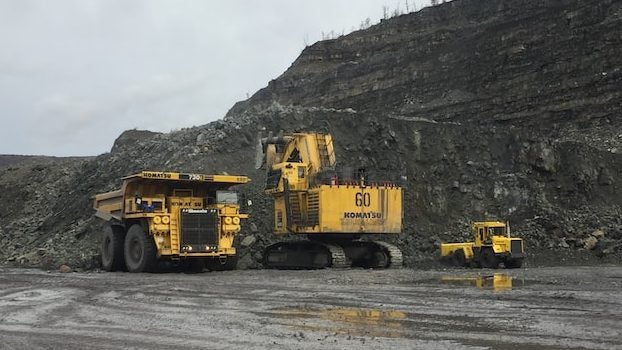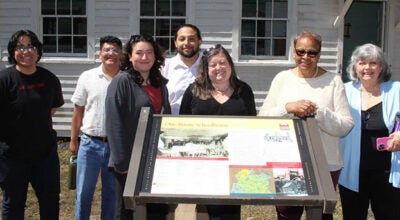Ordinance would help more than mining ban, Buckingham supervisors told
Published 4:15 am Friday, November 18, 2022
|
Getting your Trinity Audio player ready...
|
DILLWYN – A mining ban alone won’t solve the problem, Dr. Ben Price said. Speaking to the Buckingham County Board of Supervisors on Tuesday, Nov. 15, Price pointed out that a simple ban would more than likely trigger at least one lawsuit.
Why? Gold mining companies will claim the county is interfering with their rights as property owners, Price said.
Instead, Price suggested, Buckingham needs to adopt a rights-based ordinance in order to control any future gold mining operations. In previous meetings this fall, Buckingham supervisors said they preferred to wait on any decision until the state makes one of their own. That time may be arriving soon. The state workgroup, assigned to issue recommendations about gold mining, held its final meeting earlier this month. They’re under orders to deliver a final report to the General Assembly by Dec. 1. Then in turn, the Assembly will determine how to handle those recommendations when it reconvenes in January.
We’ve already seen what those recommendations might look like. The Herald already obtained a draft copy of their report, as we reported in October. First, it warns of a risk to the health of local residents, if there is an open-pit gold mine in Buckingham. Second, because of how close the James River is to the prospecting site, it raises concerns about health impacts outside of the county.
We’ve also seen the report’s companion piece, which says Virginia’s gold mining regulations aren’t strong enough to protect areas like Buckingham County. That comes from a report released earlier this month by the National Academies of Sciences, Engineering and Medicine. The report cautions before considering gold mining for approval, the state needs to update outdated rules created some 40 years ago.
That’s the situation Buckingham supervisors have to navigate, as they consider a path forward.
‘Prove it first’
And that’s where Dr. Ben Price comes in. Price was invited to speak at Tuesday’s meeting about an alternative route, where supervisors wouldn’t have to outright ban gold mining. He is a community organizer with the Community Environmental Legal Defense Fund and suggested approving an ordinance where gold mining operations have to “prove it safe” before they could move forward.
Any attempt to outright ban mining ends up in the courts, Price pointed out, because the corporations claim that these zoning laws and other bans deprive them of certain rights.
“Courts routinely recognize corporate claims of government takings,” Price said. “They do it based on existing case law that recognizes prospective future profits as a legitimate property claim.”
The “Freedom From Toxic Trespass” ordinance would get around that, he argued.
“It’s a prove it safe first law, so you have to prove that what you want to do is safe before you get permission to do it,” Price said.
This ordinance requires applicants to produce one instance of a mining operation anywhere in the world, similar in type and scope, which succeeded in operating without poisoning the people and environment in which it was located. If they can show a similar example, they would be granted approval to operate. If they can’t, the project can’t move forward.
Now, there are a few “catches” when it comes to this ordinance. First, it has never actually been tested in court. Second, no city or county in the U.S. has actually adopted it before, although Price said that Reading, Pennsylvania was considering it as well.
Is there a gold mine in Buckingham?
Currently, there’s no gold mine actually operating in Buckingham County. There is a group prospecting, however. In April 2019, the Canadian prospecting company Aston Bay Holdings announced they were beginning to search for gold in the area.
To be clear, Aston Bay isn’t a mining company. It’s a prospecting company. That means they search for gold, silver or other minerals, identify and purchase a location, then sell that information (and property) to the highest bidder. They can do this because under Virginia law, prospecting doesn’t require a state permit if you’re searching for anything other than uranium.
In statements given in March 2019 and July 2020, company officials declared their drilling confirmed a “a high-grade, at-surface gold vein system at Buckingham, as well as an adjacent wider zone of lower-grade disseminated gold mineralization.” In other words, they found enough to keep going. At the beginning of 2020, the company secured the right to prospect on 4,953 acres of land in Buckingham County.
As for a timeline on when work might be finished, first it has to be restarted. The company hasn’t done any work in Buckingham since early 2020.
“We have conducted only preliminary exploratory drilling on the local landowners’ properties at Buckingham, and none for the past two years,” Aston Bay CEO Thomas Ullrich said. “We have several quality potential projects, but a limited amount of funds. Over the last year and a half, we have been investing in the landowners in another county. We look forward to investing in Buckingham again.”
What happens next?
During Tuesday’s meeting, supervisors thanked Price for his proposal and let him go. They also heard from multiple residents on the issue. Each of the residents asked supervisors during public comments to adopt the ordinance and project the county against gold mining.
Supervisors didn’t make a decision either way. They have indicated an interest in bringing Joe Lerch from the Virginia Association of Counties in to learn about other ways to effectively ban gold mining. Lurch was originally set to speak at Tuesday’s meeting, but couldn’t make it.






